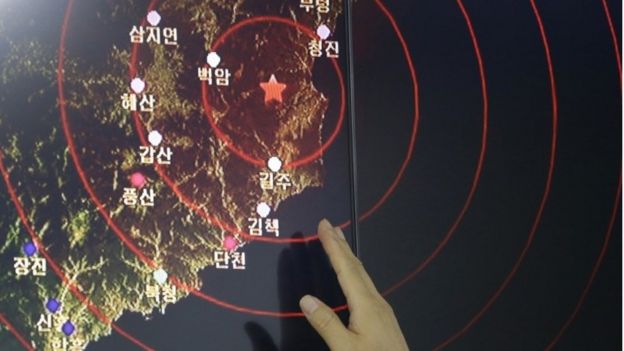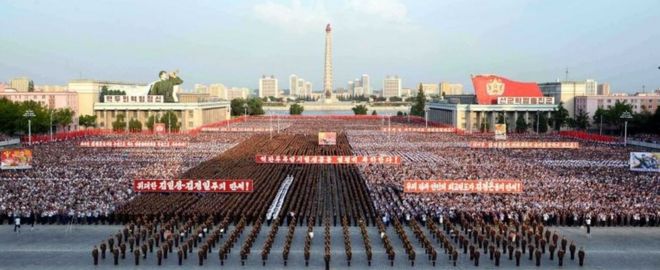China's Risk Management Gamble
"The United States cannot rely on China for North Korea."
"China is closer to North Korea than the United States."
"If you cut off the oil, there is a 50 percent possibility North Korea will not surrender their weapons, and they will hate China even more."
Shi Yinhong, professor, Renmin University, Beijing
"China is strongly opposed to North Korea's nuclear weapons, but at the same time opposes the defense system in South Korea."
Cheng Xiuaohe, assistant professor, Renmin University
"[The Thaad system -- Terminal High Altitude Area Defense System] does not change the strategic balance between the United States and China".
U.S. President Barack Obama
 |
| Pyongyang's recent nuclear test near its northeast coast on the Sea of Japan sent tremors through China's northeast. |
China has the misfortune to have an unruly, prickly and worryingly incendiary neighbour in North Korea, with a leader whose imagined entitlements deny him nothing irrespective of the concern that Kim Jong-un's deliberately provocative and dangerous initiatives raise among other neighbours in east Asia. Neighbours who not only fear giant China's assertions of sovereign rights over areas those neighbours have long considered their own, but the unpredictability and dangers posed by the impetuously arrogant flaunting of weapons of mass destruction by the North Korean leader.
The latest and largest nuclear test that North Korea set off on September 9, was about 80 kilometers from the border with China, sending tremors through the northeast of China. No reference to any such test appeared on the state-run evening television news in China, though that news rumbled alarmingly through all other media sources elsewhere on the Globe. No point concerning the Chinese and risking eliciting demands that China pull its weight with North Korea.
 |
| A huge rally was held in Pyongyang days after North Korea claimed its fifth successful test this year -- Reuters |
No point mostly because it seems increasingly obvious that there is no Chinese influence that can be exerted on the supremely confident leader of North Korea. None of the improved, longer-range ballistic missile tests and the previous nuclear tests, all of which have roiled the concern of its neighbours have resulted in any manner of disciplinary consequences. What to do, after all, with the bad boy of North Korea arrested in his social-juvenile delinquency stage of obdurate endurance and defiance?
Pyongyang and Beijing, despite Western opinion of a close mentor-student relationship, are not, after all, in a close relationship of trust and confidence. No one appears capable of quelling Dear Leader Kim's irrepressible aspiration to bring the United States to its knees in fear and trepidation of a nuclear-tipped long-range ballistic missile reaching the Pacific shore of the United States of America. No one can quite bring themselves to believe that the scenario is even a remote possibility, despite the impressive technical gains made by North Korean nuclear scientists.
The confidence of the Chinese leadership that it will never represent a target for North Korea to attack is impressive, given the prospects for the future when Kim Jong-un imagines that he will single-handedly obliterate any country that has insulted him, past and future. At the very least, bring it to heel. Chinese oil maintains a situation where North Korean ambitions are kept in check, at least how they relate to the China-North Korea relationship.
China appears to go into panic mode imagining millions of North Korean refugees flooding China, just as much as it loathes the very thought of a Korean Peninsula unified, with an American defense treaty on its very doorstep. The 2017 deployment of the advanced missile defense system in South Korea as assurance to the neighbourhood that the United States plans to back its allies in the face of threats from North Korea (and China), has not made the relationship between China and the U.S. any sweeter.
China sees the Thaad radar system detecting its mainland missiles, negating its nuclear deterrent; a situation that affirms China's firm resolve to continue supporting North Korea as an integral interest in Asia. Tens of thousands of American troops close to China in support of American treaty allies Japan and South Korea do not make for a happy China. It sees itself directly impacted by the American presence, certainly no less by the Thaad system's presence in its bailiwick.
The fact of the matter is, were the situation reversed, with China establishing a solid presence in the Western Hemisphere, in door-knocking distance of the United States, the reaction by any American administration would most certainly reflect concerns very similar to those of China.
Labels: China, North Korea, Nuclear Technology, Risk Management, United States

<< Home